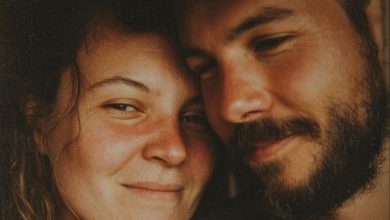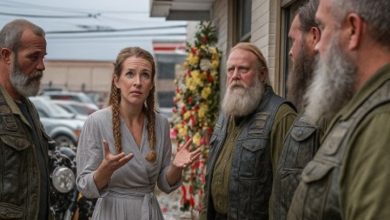An orphan who was raised in an orphanage found work as a waitress in a high-end restaurant. But when she accidentally spilled soup on a wealthy customer, her life took a sudden turn.

“Girl, do you even realize what you’ve done?!” Semen shouted, waving a ladle. “You spilled soup on the floor, splashed the customer, and you’re just standing there like a statue!”
Alyona stared at the dark stain spreading across the man’s expensive suit and felt a tight knot form in her chest. She couldn’t believe it. All her effort over the past six months—training hard, learning the menu, working late nights—felt suddenly worthless. She knew it was over. This customer would make a fuss, ask for compensation, and the restaurant would let her go without any severance.
“Please, I’m so sorry… I’ll clean it up right away,” she stuttered, rushing to grab napkins from the table.
But the man raised a hand, stopping her.
“Wait. It’s my fault. I turned around too quickly—got a phone call right then,” he said calmly.
Alyona froze. In two years of being a waitress, she’d heard all kinds of complaints—but a customer apologizing to her? Never.
“No, it was clumsy of me,” she muttered quietly.
“Don’t worry. The suit can be cleaned,” he said. Then, with a softer tone, asked, “Are you okay? Did you get burned?”
She shook her head, hardly breathing. The man looked about forty-five, with salt-and-pepper hair and glasses. He spoke in a steady, honest voice—no pretend politeness that most rich customers used.
“Let me change my clothes,” he offered. “Get me a new soup. But be careful this time,” he said, giving her a small, forgiving smile.
At that moment, Igor, the hall manager, appeared as if out of thin air.
“Mr. Sokolov, I am so sorry! We’ll cover the cost of the suit—”
“Igor Petrovich, no need. I’m fine,” the man interrupted.
Trembling, Alyona brought a fresh bowl of soup. Mr. Sokolov ate slowly, occasionally looking up at her.
“What’s your name?” he asked.
“Alyona.”
“How long have you worked here?”
“Six months.”
“Do you like it?”
She shrugged, unsure what to say. A job was just a job. It paid enough, and the coworkers were okay.
“And where did you work before?”
A simple question, but she stiffened inside. Why was he asking about her past, like they were friends?
“At another café,” she answered curtly.
Sokolov nodded, but didn’t press further. He finished his meal, paid the bill, left a generous tip, and left.
“Lucky you,” Semen muttered. “If someone had treated me like that when I was younger, I’d be set for life.”
One week later, Mr. Sokolov returned and again sat at the same table. He asked that Alyona serve him.
“How are you?” he greeted her when she handed him the menu.
“I’m fine,” she replied quietly.
“Where do you live?” he asked.
“I rent a room.”
“Alone?”
She put the menu down a bit sharply. “Yes,” she said.
He raised his hands. “I’m sorry, don’t take it wrong— you just remind me of someone.”
“Who?”
“My sister. She was independent at your age, too.”
Alyona felt something tighten—a painful realization: “Was” meant the sister had died.
“Does she work somewhere?”
“No,” Sokolov paused. “She’s been gone a long time.”
Their conversation was cut short when another customer asked for the check. By the time Alyona returned, Mr. Sokolov was finishing his salad.
“Can I come here often?” he asked. “I like it here.”
“Of course. It’s a public place.”
“And if I ask to always be served by you?”
She shrugged. Customers always got what they wanted—especially when they paid well.
Soon, he was coming twice a week. Always ordering the same: soup, salad, main course. Eating slowly, sometimes taking calls. He was the ideal customer.
Gradually, he started opening up. “I own a chain of hardware stores,” he shared one evening. “My wife and I live just outside the city. We don’t have children.”
He asked simple questions:
“Where are you from?”
“From the city,” she answered with care.
“Are your parents alive?”
“No.”
“Have they been gone long?”
“I don’t remember them. I grew up in an orphanage.”
He paused, his spoon hovering. “Which one?”
“The fourteenth on Sadovaya.”
“Got it. How old are you?”
“Twenty-two.”
“When did you leave?”
“At eighteen. They gave me dorm housing at first, then I rented a room.”
Sokolov set down his spoon and looked at her for a moment, really looking.
“Is something wrong?” she asked.
“No, it’s nothing. It’s just… my sister grew up in an orphanage too.”
“Poor her,” Alyona said softly.
“Yes. I was a university student, living in a dorm. I couldn’t take her in,” he said quietly. “I was surviving on just a small scholarship.”
“What happened then?”
Sokolov closed his eyes. “A year before I graduated, she got pneumonia and died. I couldn’t even go to her funeral. I found out about it a month later.”
Alyona didn’t say anything. She had no right to reopen those old hurts.
A week later, Mr. Sokolov showed up with a small gift box.
“What’s this?” she asked, surprised.
“Open it,” he urged.
Inside lay a pair of simple gold earrings—elegant, yet modest.
“I can’t take these.”
“Why not?”
“Because we barely know each other.”
He gave a patient smile. “No strings attached. Just a token of appreciation.”
“For what?”
He paused, choosing carefully. “Do you have plans for your future?”
She shrugged. “I work and save for an apartment.”
“Would you like a different job?”
“To what?”
“There’s a manager position at one of my stores. You’d earn three times more than here.”
She sat back. “Do I have to do something special?”
“Work. Receive shipments, manage staff, prepare simple reports. I’ll teach you everything.”
“Why me?”
“Because you’re responsible. You’ve worked six months with no complaints. And I want to help you.”
“Why?”
He took off his glasses, rubbed his eyes. He told her his sister’s story—parents died in a fire when the sister was twelve, he was in university. He had planned to bring her home, but she fell ill and passed away. He blamed himself.
“I’ve thought about that every day of my life,” he said. “If I’d left school and brought her home—maybe she’d still be alive.”
“So what?” she asked steadily. “You both would have survived?”
“Maybe. But she would still be here.”
“You can’t know that.”
“I do. They treated her badly in that orphanage. She deserved better.”
“I’m sorry for your sister. But I’m not her.”
“I understand,” he said softly. “But please let me help you.”
She took the gift box and looked at it.
“I’ll think about the job. But please—take the box back.”
He looked surprised. “But it’s just a gift.”
“That’s why I can’t accept it.”
That night at her rented room, she called Valentina, her friend from the orphanage.
“I don’t trust rich people who are too nice,” Valentina said, biting into an apple. “There’s always a catch.”
“He treats me like an older brother… even a father.”
“Even worse. That means he expects something.”
“Stop it,” Alyona snapped back. “Don’t jump to conclusions.”
“You remember Natasha Krylova?” Valentina said quietly.
Alyona remembered—Natasha left with a man who promised everything, came back beaten and pregnant.
“He wants to give me a good salary,” Alyona said.
“Talk to Igor,” Valentina urged.
Igor’s advice echoed the same warning.
“He’ll want something in return. He may want a daughter replacement—or something worse.”
She told him Sokolov’s story. He just nodded.
“I know his motives—but don’t expect pure kindness. People like him give with strings.”
Still, Alyona accepted the job. She wasn’t doing it for money alone. She was burned out from serving tables and dealing with customer complaints.
The store was in a suburb, selling building supplies. Staff included three salespeople, a loader, an accountant—and now, her. Sokolov taught her over a week. He was patient, never angry at mistakes.
“You have a good memory,” he said. “You’ll do fine.”
The first month was tough. The staff didn’t trust her— she was young, inexperienced, and clearly the boss’s choice. But she stayed late, learned product lines, prices, supplier names, and procedures.
Month by month, she improved. Sokolov came weekly. Check-ins followed a pattern:
“How are things?”
“Okay.”
“If anything is unclear, call me.”
“Sure.”
“And how’s the housing?”
“Still renting.”
“Looking for your own place?”
“For now, yes.”
“Need help with realtors?”
“Thanks, but I can handle it.”
He didn’t insist—a genuine respect showing behind his calm demeanor.
Two months in, he called her to dinner—not in a restaurant, but at his home. His wife, Marina, cooked.
Alyona hesitated. Meeting her boss at home felt awkward.
“Don’t worry,” Sokolov said gently. “It’ll be calm, quiet.”
His house was large with a garden and pool. Marina greeted Alyona with a firm, reserved handshake. She spoke little during dinner, but made keen observations—especially when asking about Alyona’s educational plans.
“Have you thought about higher education?” she inquired.
“I have, but not right now,” Alyona answered.
Marina gave a polite nod. “Work comes first.”
“She’s just curious,” Sokolov whispered.
Alyona met Marina’s gaze and talked about her tough upbringing and orphanage survival. Marina listened but said nothing. Later, Sokolov said sharply, “That will be all for tonight.”
Alyona quietly stood up. “Thank you for dinner,” she said, already heading to the door.
On the ride home, she thought about Marina. Jealousy was natural—her husband devoting attention to a much younger woman from an orphanage could look threatening.
Next day, Sokolov called.
“I’m sorry about last night. Marina was upset.”
“It’s fine,” she said.
“No—it’s not. She didn’t have a right to act that way.”
“I understand her. I’d worry if my spouse started spending time with a stranger.”
He was silent.
“You’re not a stranger,” he said, his voice soft. “You’re special.”
“Because I remind you of your sister?”
“Not just that.”
“Why then?”
“Weak people break. You didn’t. You didn’t complain or give up. You kept moving forward.”
She swallowed. “There are many like that.”
“More than you think.”
A month later, the rumor hit: Sokolov bought her an apartment. A studio in a new building on Rechnaya, and it was being put in her name. She heard the whispers in the staff room and felt frozen.
She waited until lunch, then called him.
“We need to talk.”
He suggested the café Europa in town. He was already there when she arrived.
“Are you actually buying me an apartment?” she asked.
He didn’t deny it. He answered, “Yes.”
“Why?”
“I want to help you.”
“You don’t owe me anything.”
“I know—but it matters to me.”
“For what? What have I done for you?”
He removed his glasses, wiped them. “My sister was named Alyona, too. Blonde, grey-eyed, stubborn—just like you.”
A sharp pain cut through her. She struggled for control.
“And?” she asked, voice trembling.
“When I saw you, I thought… I thought I saw her all grown up.”
He paused.
“I know it’s absurd—you’re not her. But I needed proof someone from that orphanage could build a good life.”
She looked down. “Then you’re helping yourself.”
He nodded.
“But that doesn’t make the help any less real.”
“It does. Because you see me only as someone else’s memory.”
He looked away, quiet.
“What if I offered the apartment to someone else?” he tried.
“Maybe I’d believe you.”
“So it’s about your feelings.”
“It’s not about feelings. I won’t be anyone’s replacement.”
He slowly nodded.
“Understood. I’m sorry for wasting your time.”
“Don’t be upset. I appreciate the job, your faith in me…”
He cut in: “Faith in using you?”
“For trying.”
He left, leaving money on the table.
The next day, she resigned. She handed the letter to a secretary.
“Please pass this along.”
“Boris Viktorovich values you,” the secretary said softly.
“I’ve decided on a change,” Alyona said lightly.
That evening, Sokolov called.
“Alyona, don’t act on impulse.”
“What?”
“I mean—not because of our last talk.”
“I’m not. I realized I want to be a cook.”
He was quiet.
“Really?”
“Yes.”
“Then good luck.”
“Thank you.”
Back at her old café, Igor cheered her return.
“Alyonka! We thought you’d forgotten us.”
“I couldn’t—if there was something to lose,” she laughed.
Semen took her seriously. “You’ve got skilled hands. Just don’t rush things.”
She enrolled in evening culinary classes while working as a waitress. Practicing recipes late into the night.
Valentina tasted one of her dishes.
“It’s delicious — but why are you doing this?” she asked gently.
“I don’t want to be at someone else’s mercy.”
“One day you accepted an apartment…”
“But it wasn’t truly mine. It was meant to fill his sister’s memory.”
Valentina shook her head. “So what? An apartment is still an apartment.”
“It matters what it means,” Alyona said softly.
Six months later, she worked as an assistant in the kitchen. The pay was modest—less than she had earned—but she felt fulfilled for the first time.
One evening, Mr. Sokolov returned to the café. She served him quietly.
“Soup of the day, Greek salad, grilled fish,” she said.
“Good,” he replied. He ate in silence.
Before leaving, he stopped at her table.
“Alyona, may we speak?”
“Sure.”
“I want to apologize—because of everything.”
“No need.”
“You were right. I was projecting my sister onto you.”
“And now?”
“My wife and I are doing charity work now. Supporting orphanages—and we won’t try to replace anyone.”
Alyona nodded.
“Meeting you changed me,” he continued. “Made me rethink how I treat people.”
She met his eyes. “Me too.”
He smiled gently. “How so?”
“I learned to believe in myself—and that I can choose my own path.”
He looked proud. “Then we’re even.”
“It seems so.”
He left money on the table—exactly enough. No more, no less.
“And that was just right.”
THE END



